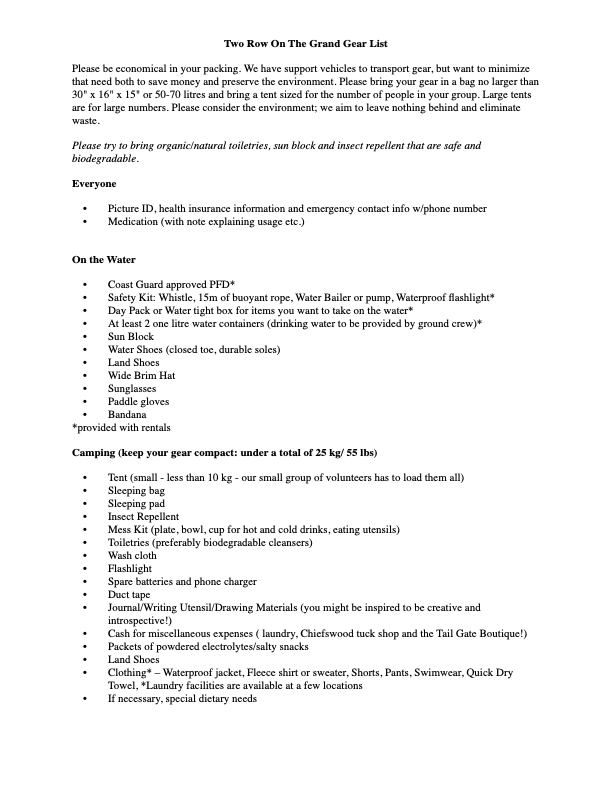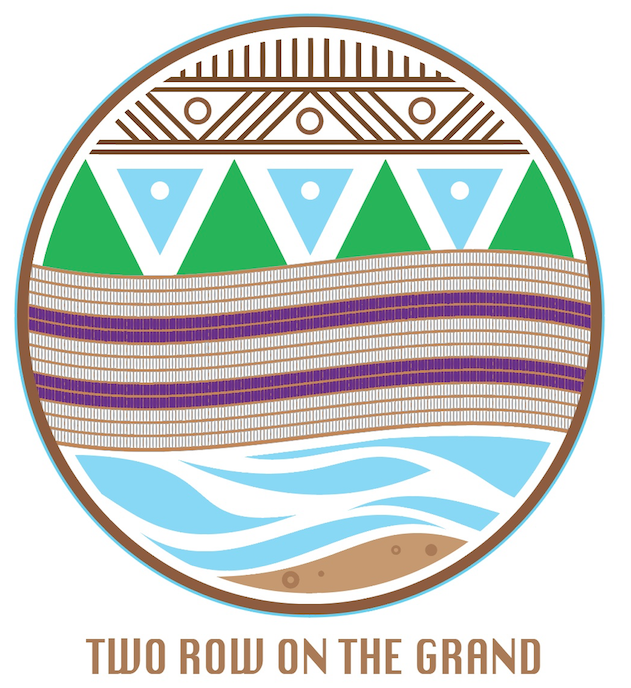
Days on the River
Spots each day
Hour west of Toronto
Registration
will open for adults on March 15, 2026. If you wish to register a youth/child or as a volunteer, you will need to contact tworowinfo@gmail.com for the applicable link.
What is
the Two Row on the Grand experience?July 15 - 24, 2026
Day(s)
:
Hour(s)
:
Minute(s)
:
Second(s)
Subscribe to our YouTube Channel to see
Our Paddling Videos
and
TRED Talks:
Gaining Traction with Reconciliation
Questions?
You can find FAQs and a gear list at the bottom of this page.
The Two Row on the Grand
We are committed to paddling the wampum belts from Cambridge to Port Maitland again this coming summer in a full 10 day paddle, sharing the river, meals, campgrounds and cultural/environmental teachings each day. You may also paddle the first 5 or last 5 days. If you prefer to bike or walk, check out the trail network at http://www.grandtrails.ca/.
Your Paddle Family planners
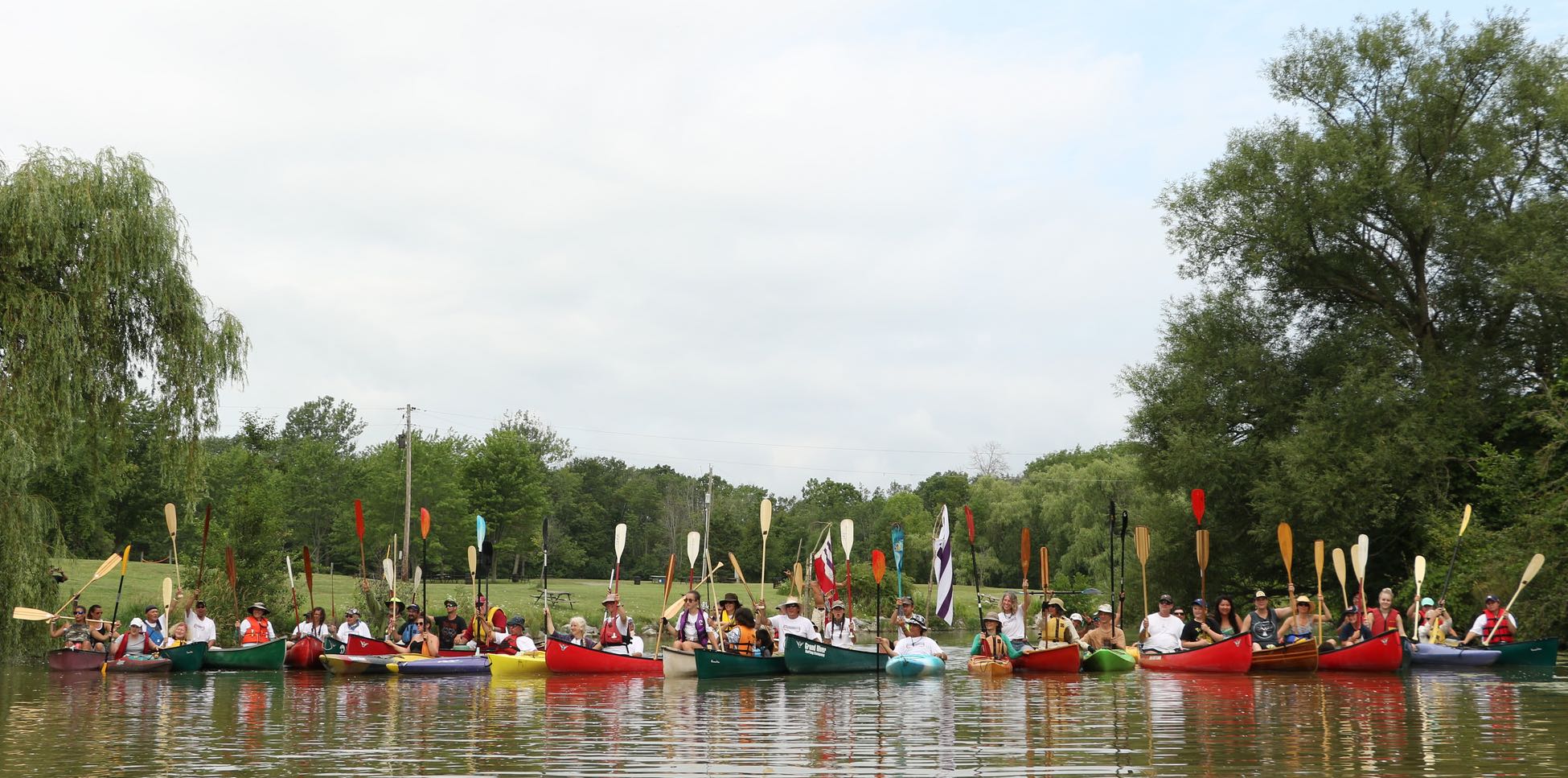
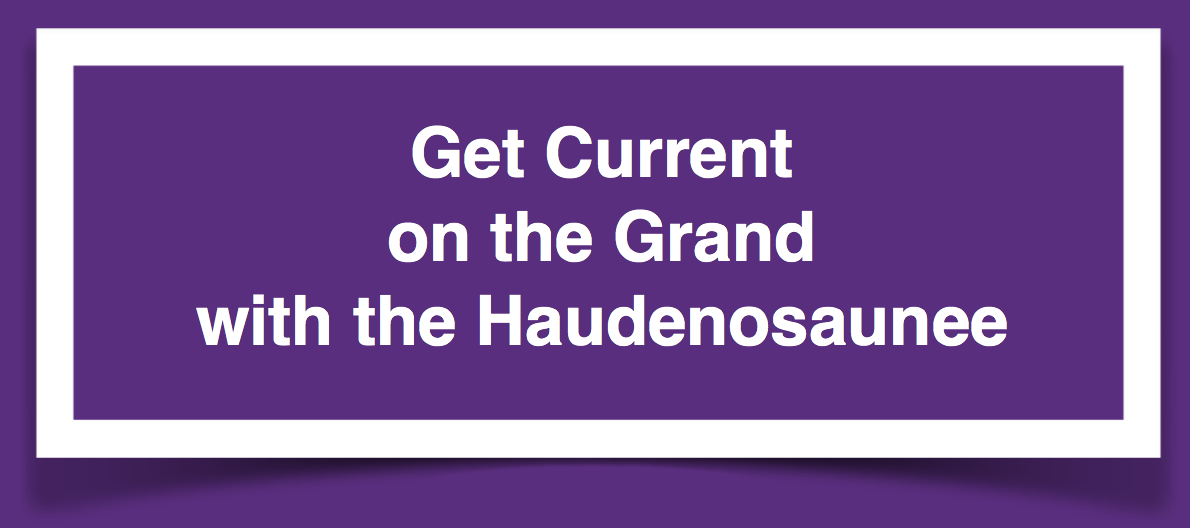
Hi & She:kon!
Join us for the “Two Row (Wampum) on the Grand (River)” and paddle down the Grand River with Haudenosaunee Nations! We’re following up the successful 2013 Two Row Wampum Renewal Campaign on the Hudson River and have passed our tenth year. The years have seen great experiences of paddling, sharing meals, campgrounds and teachings. We also won a tourism award for partnerships!
2024 was the first year of the Two Row on the Grand as part of a credit course in Indigenous Studies or Social Work. Students from McMaster U and the U of Waterloo joined us well prepared to learn from and share their experience as part of their studies. Students from the U of Guelph joined as an experiential offering through their university.
This event is a symbolic enactment of our original Two Row Wampum treaty – put in place over 400 years ago. Help us embody the treaty, paddling down the Grand River from Cambridge to Port Maitland.
We will paddle in Two Rows when possible – one Indigenous row, and one ally row – to embody the simple concept of the Two Row Wampum Treaty. Our teachings say to paddle down the “river of life” on parallel paths, as friends close enough to help each other, but not so close as to disrupt the other’s path; interacting with the Good Mind, good words and good actions.
Together, we will share the river, campgrounds, meals, educational events, traditional teachings, interactive dancing, storytelling, and sharing circles. Not to mention Open Mic Night!
Tentative Itinerary for 2026
Slideshows and videos
Shuttle Chat
Paddlers arrange shuttling amongst themselves on their first evening together or ahead of time in our Group Chat on Facebook.
About Us
Our Vision
The Two Row on the Grand canoe paddle is an embodiment of the Two Row Wampum – the original peace treaty between indigenous and settler communities. We envision an annual canoe trip where participants, Indigenous and non-Indigenous, build mutual respect and understanding of individual values and culture through sharing the river, meals, campgrounds, mutual aid, cultural/environmental teachings, friendship and summer fun.
This experience results in long-lasting friendships, an increased understanding of each other and our cultures, and through friendship, peace. Participants will be able to partake in educational events given by knowledgeable persons each day: treaties, cultural teachings, dance/social demonstrations, storytelling, environmental concerns, and sharing circles.
We have approval from all municipalities along the Grand River to stop in each community and host cultural events open to local community members. Through this experience participants can build long-lasting friendships with those in surrounding communities. At the end of the canoe trip we will host a culminating event that will commemorate the polishing of the chain of friendship between Canadians and Six Nations community members.
Who We Are
We’re a grassroots, non-profit group of local Indigenous and non-Indigenous volunteers who want to spread awareness of the Two Row Wampum in a positive way.
By carrying the idea of the Two Row Wampum down the Grand River we can re-polish the chain of friendship with our neighbours and each other while having summer fun. The group was created as a direct result of the success of the Two Row Wampum Renewal Campaign in 2013. Details of this successful initiative can be found at http://honorthetworow.org/epic-canoe-trip/itinerary-and-map/. Four Canadian and Haudenosaunee members of this journey agreed that a similar initiative would be of benefit to the Haudenosaunee and non-Indigenous community members along the Grand River watershed. This experience was transformational for us and we wanted to create an opportunity for more of our neighbours to participate in this journey of healing. In sharing circles as the trip was coming to a close, we found that it had such an impact on people’s lives that we felt it important to offer the experience on an annual basis. For further information see the FAQs at the bottom of this page. If your question isn’t answered there, try emailing: tworowinfo@gmail.com
Two Row Primer
As a teaching about relationship, the Two Row Wampum solidified the unification of the previously warring five Haudenosaunee nations: Seneca, Cayuga, Onondaga, Oneida and Mohawk nations. As the first treaty on Turtle Island between Europeans and First Nations about 1613 between the Mohawks, on behalf of all Haudenosaunee, and the Dutch, the Two Row Wampum Treaty states that both nations will travel down the river of life in peace together— the Dutch in their ships and the Mohawks in their canoes. Further, each would have their own laws, values, and cultures, and would not try to ‘‘steer each other’s boat’’… tell each other how to live. The Two Row Wampum is the basis for all the treaties that followed. It was one of the wampum belts involved in the Treaty of Niagara in 1764, which confirmed the Royal Proclamation of 1763. Without this treaty, historians agree that the Americans would have successfully invaded Canada in 1812 and Canada would never have become a country. These agreements underpin the Canadian Constitution, yet are not officially recognized by the government of Canada.
The Two Row on the Grand paddle is a ten day canoe and kayak trip down the Grand River from Cambridge to Lake Erie that promotes healthy relationships, friendships, and respect between cultures, allowing Indigenous and non-Indigenous alike a chance to grow in understanding based on trust and respect.
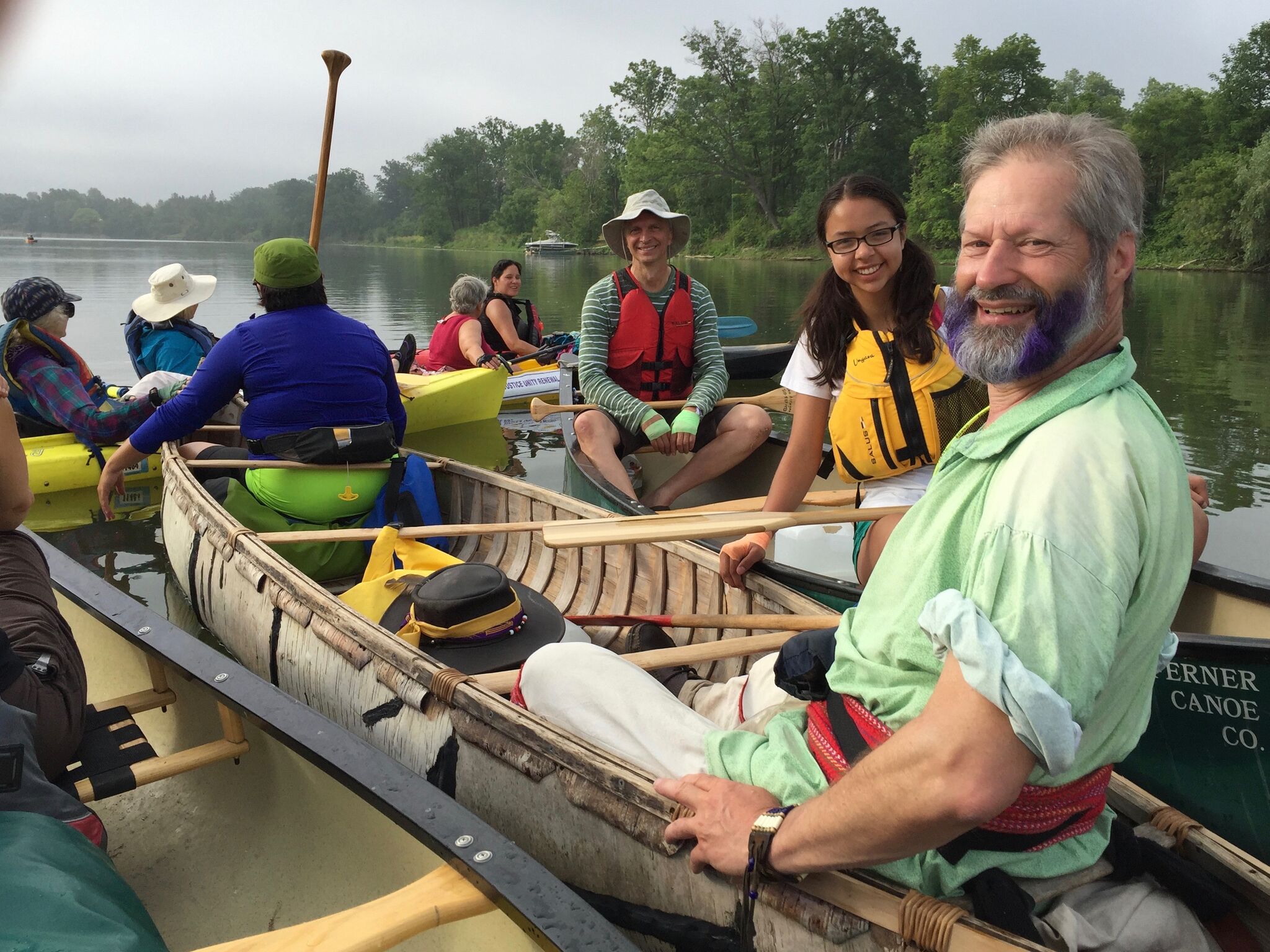
Registration
In registering, all participants agree to the guidelines below and agree to follow them during our time together. Failure to comply will result in your leaving the paddle at your own expense.
Be Respectful
Support Leadership
Be Safe
Be Reasonable
Clean up!
Follow Itinerary
Cooperate
No Drugs or Alcohol
Fees
The cost of participation covering food, Safety Paddlers, camping, logistical support and honoraria for speakers is $100 per day this year, unless you register before May 1st. The Early Bird rate is $90 per day. The latest you may register is June 1st. We are very focused on affordability for all, but the escalation of food, gas and other prices forces us to raise our fees. You may be surprised at how low the fees still are compared to outfitters’ fees. That is because we are grassroots volunteers and totally non-profit.
You may not use the public registration to register as a volunteer. You will need to contact us at tworowinfo@gmail.com for vetting and training before you will be given the link to our volunteer registration.
We also need support from all our paddlers on tasks like setting up for events, camping and meal sites, serving food, security, conducting outreach to local communities and much more. If you’d like to assist with those tasks, please let us know when you register!
Registration is now closed.
ATTENTION: If you do not see a confirmation of registration on the screen when you finish registering, it is likely because you missed filling in a required field. It may not be visible on the screen. Scroll back up until you find it, marked with a red asterisk*. If you are planning to register as a volunteer for Ground Support or Safety Paddler, email tworowinfo@gmail.com, stating your abilities and interest (Ground Support or Safety Paddler?) for instructions. Make sure you apply before May for vetting/training well ahead of the paddle. FAQs below.
Renting Your Craft?
Call 519-442-2519 or email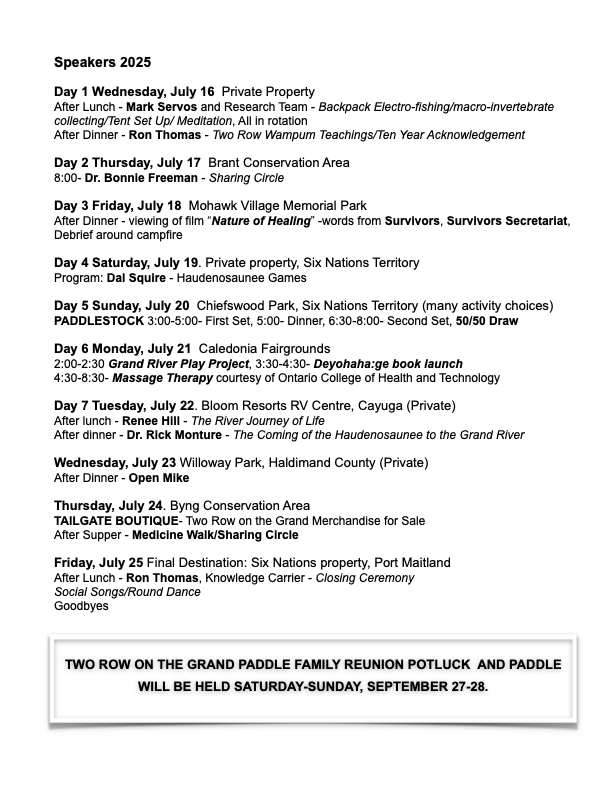
Grand River Community Play Project
You can lend your voice to a series of productions the length of the Grand River in 2025
How are you connected to the river?
Tell me more!FAQs
If you have a question, it should be answered here. If it is not, please let us know at tworowinfo@gmail.com.Why has the number of paddlers been reduced from 100 to 75 with no weekend option?
What does it mean that this is a healing paddle and how could that affect my participation?
Generally, people find paddling a healing activity: physically strengthening and corrective, meditative, restful and meeting the challenges. We encourage and help each other to meet those challenges and share those meditative thoughts.
This is also about healing the rift between Indigenous and non-Indigenous peoples through common goals, mutual aid and the Good Mind. We work together and help each other as we exchange skills, knowledge and thoughts, coming to a deeper understanding of how we came to be where we each are at present.
In addition, some people are on this journey in order to heal from trauma that they have survived, or from addictions. Without knowing who that might be, we hold safe and encouraging space for each other and avoid behaviour that could be triggering for some. If a trigger occurs, the person responsible could be asked to leave.
I’m getting into shape, what pace and distance should I target?
What kind of dietary options will I have?
Must PFDs be worn at all times?
Are children allowed?
What is your Facebook group page?
Do we HAVE to paddle in a certain formation?
Do I need to carry my camping gear in my canoe with me?
No drugs and alcohol. Are prescription medications allowed?
Should I bring refillable water bottles, plates and cutlery to reduce waste?
Could I bring my ... (insert artistic or musical instrument here)?
If you have a musical or artistic talent to share, by all means. It should be something that can safely and easily be transported either with our camping gear in the rental truck or in your vessel.
Will we be meeting the public when we stop?
What do we do if there is severe weather?
What about parking and shuttling cars?
What happens in the evenings?
May we invite people to come?
Can I bring my dog?
What items should I bring with me?
Please see the Gear List that follows this FAQs section.
